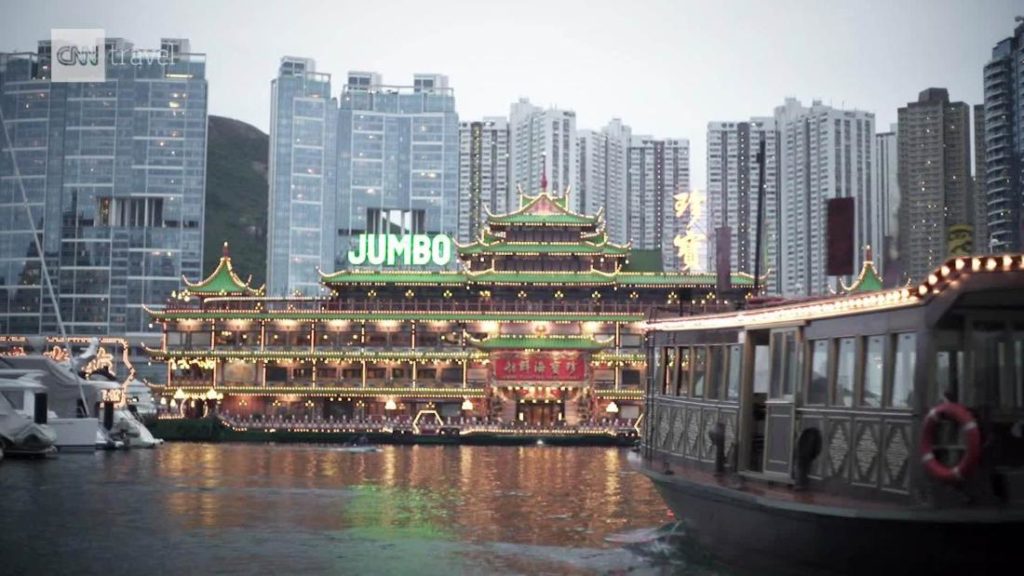Hong Kong’s Jumbo floating restaurant sinks at sea

(CNN) — An iconic Hong Kong floating restaurant has sunk, just days after it was towed out to sea en route to an unspecified destination.
The restaurant’s main boat was traveling to an undisclosed shipyard when it capsized on Saturday after meeting “adverse conditions” near the Paracel Islands (also known as the Xisha Islands) in the South China Sea, Aberdeen Restaurant Enterprises Limited said in a statement Monday.
The Jumbo Kingdom in Hong Kong, pictured in 2014.
Bruce Yan/South China Morning Post/Getty Images
The boat sank more than 1,000 meters (3,280 feet), making salvage work “extremely difficult,” the statement said.
It added that Aberdeen Restaurant Enterprises was “very saddened by this accident,” and was working to gather more details from the towing company. No crew members were injured.
On Tuesday, the Hong Kong government asked the owners for a report on how the vessel came to capsize, public broadcaster RTHK reported, amid calls for a more thorough investigation into the circumstances that led to the sinking.
The news of the sinking was met with consternation online, with many Hong Kong social media users bemoaning the inelegant end to one of Hong Kong’s most recognized historic icons.
Some posted art depicting the restaurant underwater, while others shared farewell messages or fond memories of visits past.
Hong Kong political party Third Side described the incident as baffling and accused the government and those involved in the restaurant’s management of indirectly causing the capsizing of “Hong Kong people’s collective memory,” RTHK reported.
Others saw the sinking ship as a darkly comic metaphor for Hong Kong’s alleged fortunes, as the city — still largely shut off from the rest of the world — clings on to pandemic restrictions following several years of political turmoil.
The 260-foot long (about 80 meters) restaurant was the main boat of Jumbo Kingdom, a more than 2,000 person capacity eatery which included an older and smaller sister restaurant boat, a barge for seafood tanks, a kitchen boat, and eight small ferries to transport visitors from nearby piers.
It also hosted visiting luminaries including Queen Elizabeth II, Jimmy Carter and Tom Cruise.
The restaurant, which was only accessible via small Jumbo-branded ferries, was famous for its lavish Imperial-style façade, plentiful neon lights, massive specially commissioned paintings in the stairwell and its colorful Chinese-style motifs — including a golden throne in the dining hall.
“If we look at the historical context, it was built at a time when this imperial-style Chinese aesthetic wasn’t even encouraged in China (“Old Things” were to be removed during the Cultural Revolution). So Jumbo Kingdom reflected how Chinese in Hong Kong then had a greater yearning or passion for these old Chinese traditions,” said Lai.
“It (also) reflects the close relation and history Hong Kong has with the sea.”
But as the fishing population in the island’s southern harbor dwindled, the restaurant group became less popular, and had been suffering a deficit since 2013.
The pandemic dealt the final blow, with Jumbo’s owners announcing in March 2020 they had accumulated losses of more than $13 million and the restaurant would be closed until further notice.
Several proposals had been put forward to save the historic icon, but its high maintenance cost had deterred potential investors, with Hong Kong Chief Executive Carrie Lam also ruling out a potential government bailout to save the attraction.
Without a “white knight” rescuer that the city had been waiting for, the owner’s decided to move the Jumbo Floating Restaurant, the main boat, to an undisclosed shipyard before its operating license expired at the end of June.
Tai Pak, the smaller and older boat dating back to 1952, as well as a recently capsized kitchen boat, remain docked in the harbor.
Maggie Hiufu Wong contributed reporting.
Recent Posts
- UN Tourism Shines a Light on Investment Prospects in Zambia
- U.S. Travel Announces 2024 Hall of Leaders Honorees
- Comment: Cruise is part of the solution, not the problem
- World of Hyatt Announces Exclusive Alliance with Under Canvas, the Leader in Upscale Outdoor Hospitality, Adding More Immersive Experiences for Guests and Members
- Asia Pacific Hospitality Newsletter – Week Ending 19 July 2024




Recent Comments